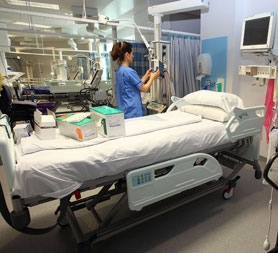The NHS reforms and you
 Victoria Macdonald
Health and Social Care Editor
Victoria Macdonald
Health and Social Care Editor
As David Cameron turns out to support the NHS reforms, our Social Affairs Correspondent Victoria Macdonald looks at what difference they will make in your local health service.
What will be different for patient care on the first day of the new NHS?
Not a lot. Which is a surprising thing to say considering the Coalition Government is selling its White Paper as the most radical shake-up of the NHS since it was formed more than 60 years ago.
The reforms – and they are massive – are about doing away with layers of management and putting family doctors and patients at the heart of the NHS. At least that is what the Health Secretary Andrew Lansley wants to happen.
So Primary Care Trusts and Strategic Health Authorities, which currently control about 80 per cent of the budget, will be abolished. The Department of Health will no longer have central control. There will be an NHS Board, which will be independent and which will set standards and hold GPs to account. They will also take care of the few services that will not be provided by GPs such as dentistry.
So when we will notice the change?
Most experts are encouraging Health Secretary Andrew Lansley to slow down and take a breath but along with the Prime Minister David Cameron, he is determined to forge ahead. To appease critics, he has introduced “pathfinder” consortia – GPs who will group their surgeries together to buy care for patients. They will effectively test if the idea works. On 17 January, Mr Lansley announced there were now 141 consortia covering half the population of England. The remainder will be expected to be up and running from 2013.
What will GPs do with the budget?
GPs will take over from Primary Care Trusts and purchase large chunks of care: hospital admissions, ambulance services, district nurses, physiotherapy, out-of-hours care. What they will not be responsible for is public health, pharmacy, opthalmology and dentistry.
So who will look after the bits the GPs do not?
As we have said, the NHS Board will take care of some of them but local authorities will also be involved, taking over public health, which could include everything from sexually transmitted diseases, to teenage pregnancies to obesity.

How will GPs control their funds?
England’s 35,000 family doctor practices will form themselves into about 500 consortia, based on geographical area. So they could be responsible for patient populations as large as one million and as small as 100,000. They will either manage themselves or, more likely, will take on managers from the PCTs and strategic health authorities, which are being abolished. Alternatively, they can take on a private company to manage them, and there are several waiting in the wings for his opportunity.
What happens to hospitals?
Hospitals will all be required to become Foundation Trusts by 2014, giving them more autonomy and freedom as to how they provide their services. They can also borrow money without asking the Treasury, and Mr Lansley is very keen that many form themselves into “mutual trusts” a lot like John Lewis, in which staff run the centre. This has already happened at Hinchingbrooke Hospital in Cambridgeshire.
But what are the chances of them closing if they do not control their budgets?
Mr Lansley was adamant that “We have to face the fact that not all organisations will succeed”. But never before in the history of the NHS has a Health Secretary willingly stood back and watched a much-loved hospital go to the wall.
Equally, it is inconceivable that they will stand by and allow GP consortia go out of business, leaving patients without a doctor to go to. However, it is now clear that it will be possible for a healthcare provider – public, voluntary, or private – to simply shut down a service if it is no longer making money.
Is this not the slippery slope to privatisation of the NHS?
Some think so, and the Coalition Government has predictably clasped the private sector to its bosom and is allowing them opportunities to step into the new regime. They have introduced the concept of “any willing provider” and that means anybody can bid to provide healthcare.
What will happen to out-of-hours care now?
GPs do not, on the whole, like doing out of hours care, and were happy to be able to hand it over to private companies who hired in locums. Mr Lansley wants them to take back this responsibility, but this could be one of the many areas where family doctors dig their heels in.
What say will patients have in all of this?
Andrew Lansley says “no decision about me, without me” is at the heart of the White Paper. Patients should have more choice, and to this end he has promised to scrap “top-down targets” in favour of measuring standards and performance through collecting information on treatment outcomes.There will be information on things like MRSA rates, but patients will also be asked for their experience during their care.
It could, though, lead to more postcode lottery with some GP consortia deciding to purchase one type of care while another refuses. Although that happens now.